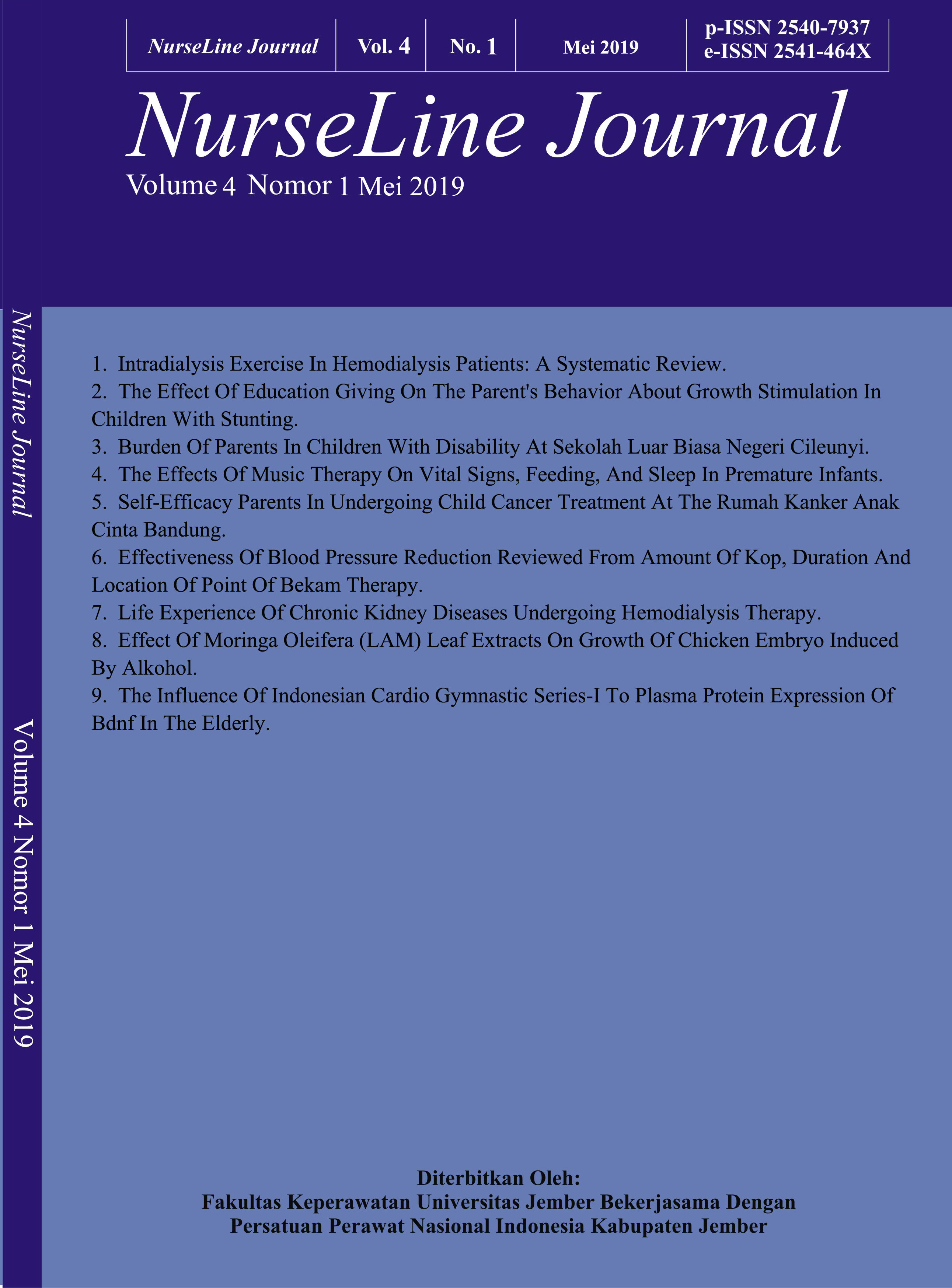Intradialysis Exercise in Hemodialysis Patients: A Systematic Review
DOI:
https://doi.org/10.19184/nlj.v4i1.8466Keywords:
Hemodialysis, Intradalytic, ExerciseAbstract
Patients with end-stage kidney disease (ESRD) undergoing hemodialysis (HD) tend to have multiple comorbidities, especially cardiovascular disease, mineral and bone disorders which are important factors and contribute to the morbidity and mortality of HD patients. So it is important to know the types of intra-dialysis physical exercises that are safe and effective for HD patients. The type of research analyzed in this journal writing is a randomized controlled trial (RCT) that focuses on inter-dialysis physical exercise interventions both at home and HD center. With a literature search using PubMed, ScienceDirect, Willey, Proquest and Google Scholar databases. And those who meet the relevant requirements and reviews are: 8. Based on several reviews of intradialytic exercise studies in HD patients, intra-dialysis low intensity strength training is found safe and effective in adults and older. Research shows that doing 30 minutes of intradialytic exercise per session 3 times a week for at least ≥8 weeks is beneficial for HD patients. Regular exercise should be considered as an important therapeutic modality in the care of patients undergoing HD. Strength training improves physical performance, nutritional status and physical activity. But this study needs further research, so that it can contribute to the provision of evidence-based information in applying safe intradialytic exercises and become part of routine dialysis treatment units
Downloads
References
Bennett, P. N., Daly, R. M., Fraser, S. F., Haines, T., Barnard, R., Ockerby, C., & Kent, B. (2013). The impact of an exercise physiologist coordinated resistance exercise program on the physical function of people receiving hemodialysis: A stepped wedge randomised control study. BMC Nephrology, 14(1), 1. https://doi.org/10.1186/1471-2369-14-204
CASP. (2017). Critical Appraisal Skills Programme (Randomised Controlled Trial). Critical Appraisal Skills Programme, 317(2017), 1–5.
Chandler, J., Higgins, J. P., Deeks, J. J., Davenport, C., & Clarke, M. J. (2017). Handbook for Systematic Reviews of Interventions. Cochrane Handbook for Systematic Reviews of Interventions Handbook for Systematic Reviews of Interventions Version 5.2.0, 1–11.
Chang, Y., Cheng, S. Y., Lin, M., Gau, F. Y., & Chao, Y. F. C. (2010). The effectiveness of intradialytic leg ergometry exercise for improving sedentary life style and fatigue among patients with chronic kidney disease: A randomized clinical trial. International Journal of Nursing Studies, 47(11), 1383–1388. https://doi.org/10.1016/j.ijnurstu.2010.05.002
Chen, J. L. T., Godfrey, S., Ng, T. T., Moorthi, R., Liangos, O., Ruthazer, R., … Castaneda-Sceppa, C. (2010). Effect of intra-dialytic, low-intensity strength training on functional capacity in adult haemodialysis patients: A randomized pilot trial. Nephrology Dialysis Transplantation, 25(6), 1936–1943. https://doi.org/10.1093/ndt/gfp739
Graham-Brown, M. P. M., March, D. S., Churchward, D. R., Young, H. M. L., Dungey, M., Lloyd, S., … Burton, J. O. (2016). Design and methods of CYCLE-HD: improving cardiovascular health in patients with end stage renal disease using a structured programme of exercise: a randomised control trial. BMC Nephrology, 17(1), 69. https://doi.org/10.1186/s12882-016-0294-7
Koh, K. P., Fassett, R. G., Sharman, J. E., Coombes, J. S., & Williams, A. D. (2009). Intradialytic versus home based exercise training in hemodialysis patients: A randomised controlled trial. BMC Nephrology, 10(1), 1–6. https://doi.org/10.1186/1471-2369-10-2
Koh, K. P., Fassett, R. G., Sharman, J. E., Coombes, J. S., & Williams, A. D. (2010). Effect of Intradialytic Versus Home-Based Aerobic Exercise Training on Physical Function and Vascular Parameters in Hemodialysis Patients: A Randomized Pilot Study. American Journal of Kidney Diseases, 55(1), 88–99. https://doi.org/10.1053/j.ajkd.2009.09.025
Kouidi, E. J., Grekas, D. M., & Deligiannis, A. P. (2009). Effects of Exercise Training on Noninvasive Cardiac Measures in Patients Undergoing Long-term Hemodialysis: A Randomized Controlled Trial. American Journal of Kidney Diseases, 54(3), 511–521. https://doi.org/10.1053/j.ajkd.2009.03.009
Liao, M. T., Liu, W. C., Lin, F. H., Huang, C. F., Chen, S. Y., Liu, C. C., … Wu, C. C. (2016). Intradialytic aerobic cycling exercise alleviates inflammation and improves endothelial progenitor cell count and bone density in hemodialysis patients. Medicine (United States), 95(27). https://doi.org/10.1097/MD.0000000000004134
Magnard, J., Deschamps, T., Cornu, C., Paris, A., & Hristea, D. (2013). Effects of a six-month intradialytic physical ACTIvity program and adequate NUTritional support on protein-energy wasting, physical functioning and quality of life in chronic hemodialysis patients: ACTINUT study protocol for a randomised controlled trial. BMC Nephrology, 14(1). https://doi.org/10.1186/1471-2369-14-259
Momeni, A., Nematolahi, A., & Nasr, M. (2014). Effect of intradialytic exercise on echocardiographic findings in hemodialysis patients. Iranian Journal of Kidney Diseases, 8(3), 207–211. https://doi.org/1250/664 [pii]
Shafipour, V., Hatef, M., Behboodi, M., Esmaeili, R., Moosazadeh, M., Nursing, N., … Science, H. (2017). Effect of home-based exercise on functional ability of hemodialysis patients: a systematic review and meta-analysis Vida, 5(2), 42–53.











